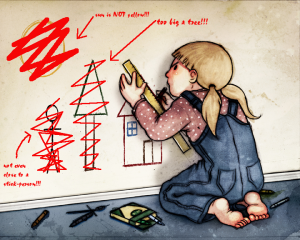
In “Are You Proud of Being a Perfectionist? – Part 1” you learn:
- What is perfectionism?
- Is the notion of perfectionism well-defined?
- Where does the drive to be perfect come from?
- What are the symptoms of perfectionism?
In this blog post, you discover many of the fears the perfectionist has as well as negative consequences of perfectionism. You then find out why striving for excellence rather than perfection is a better strategy.
Fears Underlying Perfectionism
Perfectionism is not so much about always achieving the best possible results in any endeavor; it’s more about not falling short, not failing to measure up or to be the top dog. Underlying a perfectionist’s drive are various fears that they have and the desire to quell those fears.
Remember, perfectionism is a coping mechanism that typically starts very early in the life of a child who is being abused emotionally, physically, and/or sexually by parents or caretakers. It’s as if subconsciously the child thinks “if I am perfect, if I do everything exactly right, they will love me and stop hurting me.” If the abuse is less severe on occasion, or happens less often (for reasons unrelated to the child’s coping behavior), they may think that being perfect works, at least to some extent. As the child grows up and the abuse continues, their pain is compounded, but the coping mechanism persists. Trying to be perfect in every way has become a habit which doesn’t simply dissolve in adulthood.
Fear of Failure
One of the most common fears that perfectionists share is the fear of failure. After all, failing is the opposite of being perfect. To be a failure as a musician is to be unworthy of a Grammy. The oncologist who fails to discover a cure for cancer won’t be awarded a Nobel Prize.

Fearing failure feels like the weight of the whole world is on your back
In a world where it seems that success is everything, failure is almost a sin, a reason to hang your head in shame, to go hide. And yet, some of the most accomplished entertainers (e.g. Elvis Presley), scientists (e.g. Thomas Edison), writers (e.g. J.K. Rowling), athletes (e.g. Wayne Gretzky), and even presidents (e.g. Abraham Lincoln) failed, often many times, before they tasted sweet success–unlike perfectionist Leonardo da Vinci who left so much of his work unfinished; most notably the Mona Lisa.
Fear of Making Mistakes
Perfectionists fear making mistakes. (Doesn’t failure consist of making mistakes over and over again?) To them making just one mistake is a cause for anxiety. It’s like the festering pimple that they fear everyone will notice, stare at, find disgusting and then turn away from them.

It’s far better to make a mistake than for you not to try!
Perhaps one of the telling differences between a perfectionist and a person who strives for excellence is the way each regards their mistakes. To the perfectionist, a mistake is a telltale sign of incompetence. To the one who aims for excellence, it’s an indication of the need to pivot to make progress.
Fear of Rejection
Underlying their quest for an absolutely flawless performance each and every time is a deep sense of insecurity about their abilities and, more generally, their worth. The perfectionist craves admiration as well as acceptance wherever they can find it. As a budding perfectionist during childhood, it is love and approval from their parents (and/or caretakers) that they desperately want and disapproval is what they fear.
Feeling rejected for any reason is painful–so painful that it seems like their very existence is threatened. In the subconscious mind of that child, the defense against that threat is to be perfect so that there is no reason for them to be rejected and every reason for them to be loved and accepted.

Rejected by the woman he hoped to spend the rest of his life with
Fear of Being Judged
No one likes to be judged. To be judged is to risk being found unacceptable, inferior, or simply not good enough. These negative judgments are wounding to a person’s self-esteem and self-respect.

Perfectionist Fearing Being Judged
Yet so much of life involves making judgments about others and having judgments made about us. We compare what we have to what our neighbors have: their house, their cars, their clothes, their looks.
If we judge ourselves coming out on top, we feel superior, and maybe a bit smug. If we fall short, we feel diminished as if we shrank an inch or two.
Training for competitions where entrants are judged by how well they perform according to certain criteria can be grueling. Imagine the fear of being judged that a diver who has devoted his whole life to winning an Olympic gold medal feels as he mounts the board.
Fear of Mediocrity
The perfectionist is never satisfied with being second-best, let alone ranking in the middle of the pack. Even when they start to do or learn something new, if they don’t get the hang of it right off the bat, they get irritated with themselves, and often will quit trying. The perfectionist has little or no patience for steady or even dramatic improvement. Their self-worth requires top-notch performance immediately. If they don’t get it, they are likely to quit the activity or stop the learning process.
Negative Consequences of Perfectionism
It’s no surprise that life for the perfectionist is quite taxing and often very unpleasant. Striving to be perfect in every way, when the notion of perfection in so many areas of life is ill-defined, can have one running around in circles like a dog trying to catch their tail.
If you are a perfectionist, you likely experience some or all of the following unwanted effects:
- Difficult relationships – Because you not only demand of yourself flawless execution of tasks, but you demand it of others you work with, share space with, are related to, employ, are friends with, etc. The people who are in those relationships with you find it very difficult to sustain them. No one enjoys (or deserves) a harsh taskmaster, whether you verbally criticize or express your indignation in the ways you act, such as giving condescending looks, rolling your eyes, turning your back, folding or throwing up your arms.
- Chronic anxiety – With no room for error on anything–not a typo, or a minute late, no gimmes for a putt missed by a fraction, the perfectionist can never let up or be happy with a close second. The pressure is always on, it never lets up. If you are cursed with perfectionism, chronic anxiety and excessive worry tend to be your constant companions.

Chronic anxiety causes mental, emotional, and physical pain and suffering
- Depression – It’s not surprising that studies find a strong link between perfectionism and depression. The perfectionist bases their self-worth and self-esteem on results and accomplishments, but ironically, perfectionists are often quite unproductive. Always striving to make them better, their projects go unfinished and therefore unrecognized and unappreciated. This is a source of frustration to them, which, over time, can turn into feelings of worthlessness and self-loathing. From there, it’s a small step to feeling hopeless, sad, unmotivated and drained of energy.

Suffering depression feels dark and lonely
- Negative Self-Talk – Everyone suffers negative self-talk going on in their head at some point or another. Consider the 12 year old boy who wanted to try the monster roller coaster at his hometown amusement park, thinking it would be great fun and he’d have bragging rights with his friends. But shortly after his car gets to the top of the track and starts heading downward at break neck speed a voice in his head says: “I’m an idiot for thinking this would be fun. How could I have been so stupid!” Or the voice in the head of the reluctant bridegroom puking his guts out at 4 a.m. after consuming way too much alcohol at his bachelor party saying: “What am I? Crazy? Was I trying to poison myself so I wouldn’t have to go through with the wedding?

Negative self-talk can be crippling
- Low Self-Esteem – Contrary to appearances, the perfectionist suffers from low self-esteem that typically begins in early childhood when a person’s self-concept is forming based on how the parents, caretakers, siblings, playmates treat them. The more critical, demanding, overbearing and controlling the people in the child’s orbit are, the more negative their self-concept becomes. It’s as if the child feels responsibility for being treated badly and thinks that if they do everything right, they will be treated lovingly. Unfortunately, that coping strategy fails more often to protect them from the ridicule of an angry father, neglect by an exhausted mother, or being bullied by siblings who themselves are mistreated.

Are you creating your low self-esteem?
Strive for Excellence, Not Perfection
What is Excellence?
Because perfection is such an elusive concept, striving for perfection is like a dog chasing its tail, going round in circles, never quite grasping it.
In contrast, we do typically have an idea or sense of when excellence has been achieved. In most industries where things are being invented, if you create a new functional widget that does the job it was meant to do, and does it for less money, more quickly, and for longer periods of time with less maintenance required than the old object, you have achieved excellence.
Even in artistic realms, where the objects created are not to serve a mechanical or physical function (like transporting objects from one place to another), but to serve an emotional, intellectual, or spiritual one, there still are criteria commonly recognized that need to be satisfied in order to attain excellence.

Strive for excellence, not perfection!
Striving for Excellence, not Perfection
Striving for excellence allows for mistakes, which give information about what doesn’t work, and perhaps clues as to what to try the next time. Perfectionism precludes acceptance of mistakes or flaws; it engenders a feeling of failure and frustration.
Shooting for excellence encourages finishing a project within a timeframe and feeling good about that; in contrast, shooting for perfection generates anxiousness and a need to keep extending the time (and often wasting it) to keep trying to get things better and better.
The person whose goal is an excellent piece of work has confidence based on knowledge of the standards of excellence in their field, industry, or business. With this knowledge comes a sense of clarity and clear thinking which enhances the enjoyment of the work.
In contrast, the perfectionist may seem confident, even brash or cocky, but inwardly they are too often riddled with self-doubt, overanalyzing, and second-guessing themselves. They may claim to “know perfection when they see it”, but are unable to describe in any concrete way what the standards of perfection they are working to embody are. Instead of clarity and clear thinking, they deal with elusiveness and confusion, which certainly detracts from enjoying what they do.
People who pursue excellence knowing what the standards are, tend to be more relaxed and easy going. Having developed qualities such as perseverance, dedication, commitment, acceptance of mistakes as opportunities for learning and growth, they don’t typically labor under a sense of urgency. They are used to taking consistent, constructive action towards the completion of their aims, and take pride in the progress they are making, not just in the results they achieve. They are happy to share their experiences with others, and mentor those who want to acquire the requisite skills, knowledge, and expertise to become excellent in the field as well.
Perfectionists, in contrast, tend to be stressed out and tense, laboring with a sense of urgency, often because they are up against another deadline they are likely to miss. In such a state, taking time out to offer advice or training to an up and coming artist, programmer, or writer is a rarity, and lacks generosity of spirit and eagerness to share.
For all of these reasons and more, the pursuit of excellence rather than perfection makes far more sense in that it promotes greater productivity and enjoyment of the activity undertaken, engenders a more positive work ethic, supports a healthier state of mind and body, provides a workable (rather than untenable) model for others to emulate, and creates an atmosphere in which making steady progress towards an end result is not simply recognized, but highly valued.






